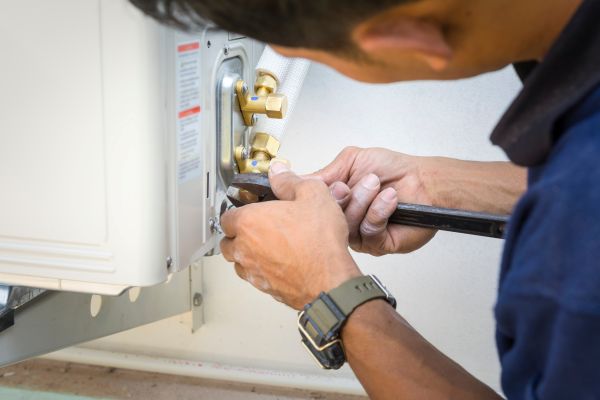Many of the HVAC systems currently operating in homes across the country are very old, having been installed decades earlier and left to do their work, often with zero upgrades and minimal maintenance. No HVAC equipment lasts forever, though, and eventually every system will need to be replaced. In doing so, homeowners can take advantage of the many advances in heating and air conditioning that have taken place in recent years. Efficiency has improved substantially.
HVAC system replacement in your home can be a big job, so it’s important to work with a professional HVAC contractor. You can be prepared ahead of time by understanding the key steps involved. When you know what to expect from every part of the process, you can plan and budget for this critical renovation project.
Begin with an Assessment
We mentioned above that the HVAC systems in many homes are very old and have seen many years of heavy use. However, this does not automatically indicate that they are outdated or nonfunctional. Before making the decision to replace or upgrade your HVAC system, it’s important to first get an expert opinion from a licensed heating and cooling professional.
If you are considering having a new HVAC system installed in your home, a consultation with a professional contractor can help you determine if it’s necessary, as well as the logistics of how it can be done. They will provide you with options for your new system, which can help you develop a budget.
As part of the assessment process, your HVAC professional will also determine any other needs your home may have with regard to effective heating and cooling. For example, they may determine that your insulation requires an upgrade before your new HVAC system can perform optimally. They will then make recommendations for home repairs and upgrades that will maximize the efficiency of your home and new system.
Obtaining the Necessary Permits
In many municipalities, replacing an HVAC system requires a valid, legally issued permit. This is to ensure that your home remains compliant with all local electrical and environmental regulations, among other crucial conditions.
For example, most cities and counties consider it necessary for homeowners to secure permits because HVAC technologies make use of controlled chemicals such as coolants. A permit is critical for securing insurance for the building process, as well as legally necessary should the owner ever decide to sell the home. The rules are also different for new systems as opposed to those installed decades ago.
Most professional contractors will not even begin the installation process until the necessary paperwork has been filed, so applying for the required permits should be the first official step in the process. To obtain a permit, you’ll need to work with your contractor to design a detailed plan for everything that you are proposing to do, including any alterations that will be made to electrical systems, ductwork, and gas lines. Your contractor may even handle the process of obtaining the permits on your behalf once plans are finalized.
Replacing the Old Equipment
As the process of an HVAC system replacement begins, it will be necessary to remove your existing equipment so that the new elements can be installed in its place. How long this takes will depend on how extensive the replacement is. In many situations, only the operating machinery, such as the furnace and the AC compressor, will need to be replaced, with the original ductwork being perfectly adequate for the new system. If that’s the case, the replacement can occur with minimal downtime, with the work often completed within a single business day.
For a more extensive HVAC system replacement, including one where new ductwork must be installed (or even removed if the homeowner is opting for a ductless system), the process can take a great deal longer. For larger installation projects, expect the HVAC system to be out of commission for up to a week. While it will likely not be necessary to leave your home during this time, you may choose to do so if you find the lack of heating and cooling makes the building too uncomfortable.
Testing Your New System
After the installation process is complete, your HVAC professional will perform a number of tests to determine if it’s operating safely and effectively. Among the most important of these is testing the electrical connections for your machinery. This is critical to ensuring your HVAC system is operating at peak capacity and that it is functioning safely, without the hazards inherent in faulty electrical wiring. Your HVAC contractor will test the voltage of each connection point and check all the wiring before moving on to the next part of the test.
Your contractor will run both the heating and cooling elements of your new HVAC system to ensure they are working properly. They will listen for any unusual sounds and perform a visual inspection to determine that nothing is out of place. They will also use a variety of tools to check that coolant levels are at the correct pressure and that no leaks are present. Finally, they will check the ductwork and filtration systems to make sure they are clean and unobstructed.
Optimizing Your New HVAC System
Once your new HVAC system has been installed and tested, you can begin to take advantage of its many benefits, such as improved air quality and energy efficiency. It’s important, however, that you work closely with your HVAC professional to ensure your new system is optimized and remains so. Part of this is maintaining effective insulation within the home and investing in regular maintenance as part of an ongoing commitment to the efficiency and longevity of your heating and cooling technology.
If you’re in the market for a new HVAC system or need repairs and maintenance performed on your current system, contact All Weather Heating & Cooling today. Our experts will work with you to help you find the perfect HVAC system for your home so that you can save money on your yearly energy costs while keeping your home comfortable all year.

